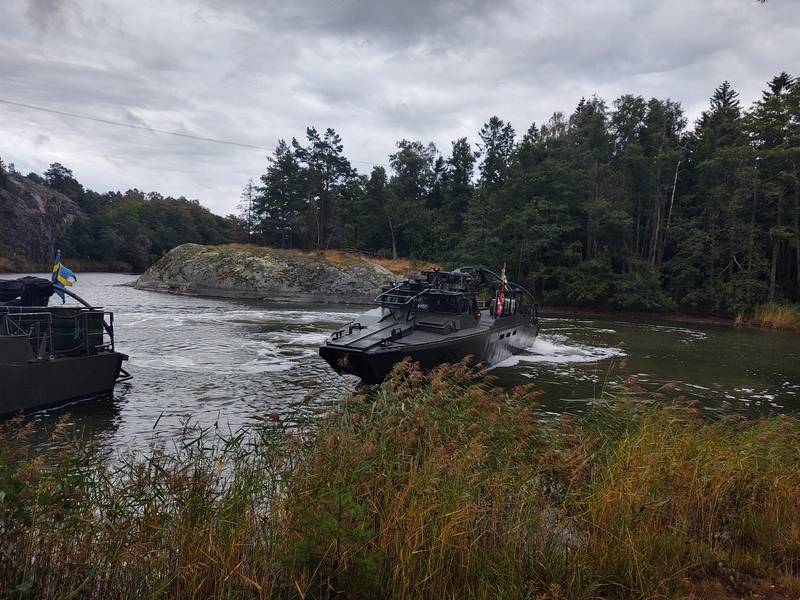The Swedish-built Combat Boat 90 (CB 90) has established itself with military forces around the world as both a warrior and a workhorse. The 52-foot boats first entered service in 1991 as troop carriers with the Swedish Marines, which is still procuring them. There are more than 250 operating worldwide today.
These rugged boats are optimized for high-speed / shallow-draft operations in and around Sweden’s many coastal islands, but they have also proven to be ideal for a variety of other applications and operating environments.
The CB 90 is 52 feet long, with a draft of just 2 feet 7 inches. Standard displacement is about 17 tons. It’s powered by a pair of 625 hp Scania V8 diesels and Kamewa waterjets, so they’re both fast—40 knots plus–and maneuverable. In fact, there are control surfaces in the waterjet tunnels which improve maneuverability.
The CB 90s are built at Dockstavarvet shipyard on Sweden’s east coast. The company was acquired by Saab Defense in 2017. The Storebro SB90E civilian and export version is made by Storebro Bruks AB.
Dockstavarvet describes the CB 90 as “an all-aluminum fast assault craft, heavily reinforced for forceful landing on unprepared beaches.”
The basic troop carrier version usually has a crew of three and can carry about 18 to 20 combat equipped troops, or carry 4.5 tons of cargo. The CB90 can make a direct approach to a beach or shore line and discharge personnel through the bow ramp. The boats can be carried on larger ships or transportable by land.
Operators include Swedish Police, Swedish Sea Rescue Society, Hellenic Army, Hellenic Coast Guard, Mexican Navy, Malaysian Navy and the Marina de Guerra in Peru. The Royal Navy leased four boats for several years.
The boats can be outfitted for water sampling or other environmental protection missions. Boats that will be operating in the tropics can have upgraded power systems for air conditioning and fuel cooling.
The Royal Danish Navy operates the SB90E aboard the Absalon-class ASW frigates / flexible support ships, as well modified versions capable of operating in and around ice for the Knud Rasmussen class of Arctic Offshore Patrol Vessels, patrol vessel.
The U.S. Navy operated six CB 90s, which they called Riverine Command Boats as part of the Navy Expeditionary Combat Command (NECC). The U.S. boats were built by SAFE Boats International of Port Orchard, Wash. The heavily armed RCBs were based in Bahrain where they provided high-value ship escort duties, usually operating in pairs.
The American RCB version is equipped with several universal topside mounts for machine guns or grenade launchers, as well as a remote-operated small arms mount (ROSAM). The RCB has a crew of four to eight, which are required to operate the boat and the weapons, but can also carry addition troops. The U.S. version also has The RCB armored cockpit and engine compartment protects the crew and systems against small arms fire or shrapnel. The U.S. Navy phased out the RCBs in favor of the larger MK VI patrol boats, which are also being phased out.
Sweden is by far the biggest user with more than 200 craft, and the boats are still in production. The newest variant, the Docksta CB 90HSM, is being offered by Saab. It features “a robust weapons platform can include stabilized turntables, smaller missile systems and remote weapon stations like Saab Trackfire.”
According to Saab, an adjusted placement of the engine makes the boat more stable, faster and quieter. Saab said the new version has improved speed, maneuverability, attack power and surveillance capabilities.
The Swedish Marines are skilled at navigating their CB 90s at high speed in confined waters between the many islands of the archipelago. The Naval Base at Berga, about 20 miles south of Stockholm, is home to dozens of them. At the recent Archipelago Endeavor exercises, Swedish and U.S. Marines relied on the CB 90 for movement around and between the many islands, and used the boats to launch unmanned vehicles.

https://www.marinelink.com/news/navy-swedish-combat-boat-a-warrior-a-500735


